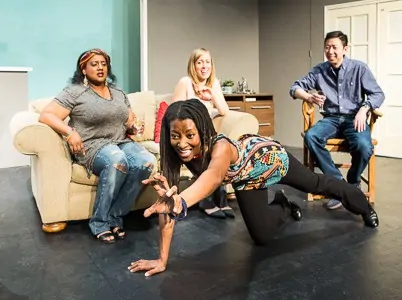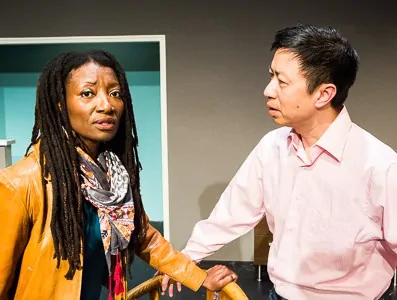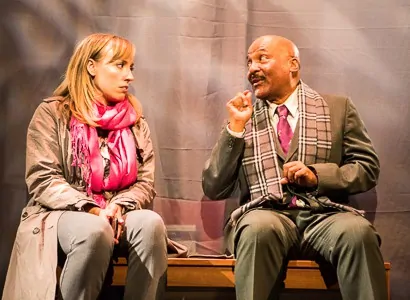Tanya Barfield’s The Call is nominally a play about adoption. As such, the premise (an exploration of a couple’s excitement and doubts about adopting a daughter from Africa) intrigued me. Two of my siblings are adopted from abroad, and I imagined I would connect with the characters’ struggles. In fact, while adoption serves as the plot’s driving force, Theatre Rhinoceros’s production is at its best in the scenes that have little to do with it.

This is largely because the strongest characters are not the couple doing the adopting, but rather their black, lesbian family friends. Rebecca (Nkechi Emeruwa) is an avid storyteller, climbing on the coffee table to demonstrate a terrifying situation with a lion that she encountered on a safari. She’s also wonderfully outspoken, warning that the adopted child is “in danger of nappy I-got-white-parents-hair syndrome”. In that trait, she is more than matched by her partner Drea (Alexaendrai Bond). She delivers some of the best laugh-provoking lines in the show in spunky deadpan, most notably her claim that slavery is “original sin for white folks.” She is the perfect embodiment of (in another character’s envious words) “self-possessed lesbian exotic chic”.
The Call is thought-provoking and entertaining, with moments of excellent humor.
The relationship of the central couple, Annie and Peter, develops with nuance. In the initial scene, their interactions are characterized by a blend of sweetness and exasperation. But their struggles with the adoption—a domestic adoption that falls through, Peter’s doubts about adopting from abroad, and Annie’s reluctance to accept a daughter who is older than expected—drive a wedge between them. At this point, Melissa Keith’s acting as Annie falls apart, descending into melodrama out of proportion with both her situation and the size of the theater. Hawlan Ng comes across better as the more reserved Peter, especially during his two emotional and surprising monologues about his own experiences in Africa.

Darryl V. Jones has a small but star turn as Annie and Peter’s next-door neighbor Alemu. An immigrant from Africa, Alemu struggles to make himself understood through a thick accent. He is both solicitous towards his neighbors, bringing them a Bundt cake but shyly refusing to stay and chat, and eccentric about his home country, showering them with syringes, shoes, and soccer balls to take to Africa, “the continent, not the country!” His stories, including a folktale with a lion and his tragic personal history, are captivating.

Director Wai-keung Lowe helps the actors find a good balance between naturalistic conversation and engaging storytelling. His set concept helps the show run smoothly and believably: with minimal transitions involving nothing more than folding walls, a bench, and a curtain, the set becomes a dog park, a gallery hall, a nursery, and a living room.
Many of this show’s weaknesses stem from the writing more than the production. While engaging characters sling around witty lines, the show seems to spin its wheels for a long time. Nothing really happens, and nobody really changes. The play’s end also feels jarringly abrupt: after Alemu tells the story of his childhood, Annie suddenly agrees to the planned adoption. Blackout. I was left with the uncomfortable sense that she was making her decision based on momentary feelings of pity and guilt, rather than from the conviction that this child would be good for her (and vice versa). Better writing and better acting would be needed to make her change of heart subtler and more credible.
The Call is thought-provoking and entertaining, with moments of excellent humor. But between the weaknesses of the script and the unsuitability of the central actress, it’s not a memorable theatrical experience.
2/5


